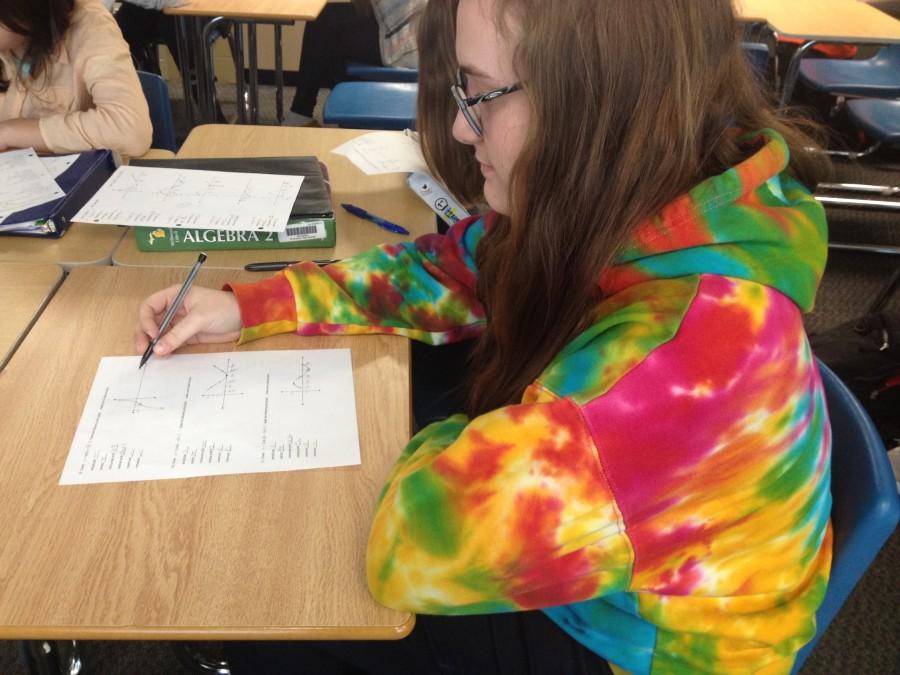Junior Sarah Carpenter sits down in front of the ACT, not feeling any more prepared despite having taken two PLAN tests for practice. She finds herself overwhelmed by the time limit and the amount of questions, and feels her heart begin to race. The clock is ticking and she still has so many pages to go. Nothing has braced her for the amount of anxiety the ACT places.
Prior to the switch to the SAT, the district administered PLAN tests to freshmen and sophomores. The predictions of an increase in scores from ninth to tenth grade were logical, according to Information Literacy Specialist Ms. Julie Harris.
“These are the exact same tests that our juniors took as sophomores, [and it] indicates that our students are progressing well within their grades,” Ms. Harris said. “So that makes perfect sense that as a freshman you weren’t as good on the exact test as you were when you took it as a sophomore, and then you can attribute that to maybe students are more comfortable taking this test because they took it in 9th grade so when they take it in 10th grade… they’re not as nervous and are more familiar with all this work.”
The PLAN scores from this year’s juniors showed improvement by one point in all areas except for reading. Junior Lawrence Latouf discussed his theories on what the reasons behind the statistics may have been.
“Most people run out of time, and they give you last minute answers,” Latouf said. “It kind of helps with the time if you read the questions then look for the answers in the text.”
Carpenter had other ideas on why there was a lack of improvement in PLAN scores for the reading area, based on concepts regarding classes as opposed to testing strategies.
“We don’t really have a reading class. It’s more of like grammar,” Carpenter said. “There’s not actually reading and absorbing and retaining information and understanding it.”
Ms. Harris had similar thoughts.
“There’s no one class that just does reading skills but yet you get to read in all classes,” Ms. Harris said. “That is an area we call content area reading means you’re reading in your content.”
To change that, the district is implementing more in-class practices for the month of February.
“We had just given the teachers a whole bunch of preparation to within their different subjects,” Ms. Harris said. “The four different subjects to work with kids. So if you have a science class, that teacher’s gonna work with you on ACT prep for science type questions. We’re doing that the whole month of February. We’re working with kids that need help we set a building goal to increase this number.”
However, for junior Rachel Hsu, in-class preparations don’t help her any more on both the PLAN and ACT.
“From experience, I feel like a lot of kids don’t really take the in class preparations seriously,” Hsu said. “I think that it’s more of an individual thing. To get a good ACT score some people put in more time than others.”
Carpenter feels the same.
“Whenever we did the in class stuff, I don’t really like pay attention,” Carpenter said. “I just kind of circle random things whereas when I’m individually doing it for myself because I know I have to, then I actually get information out of it and learn and everything.”
Students put in their input on what they feel teachers can do to help them be more prepared for the reading portion of the ACT.
“They can start having us use our book more,” Carpenter said. “[The one] that they give us at the beginning of the year that we keep in our locker and collect dust.”
In terms of general preparation, some students think the PLAN test does nothing to prepare them for what’s going to be on the ACT.
“No [it didn’t prepare me for the ACT]. Not at all,” Carpenter said. “I thought I was prepared going into the ACT test but it was nothing like the PLAN… the questions on the ACT are harder and like two times more in the same amount of time.”
Latouf disagrees.
“It’s a very good prep for standardized testing,” Latouf said. “Because both of them have the same kind of aspect to it where you answer questions and stuff and the PLAN really kind of prepares you for it.”
Latouf also finds himself less anxious over the ACT because of the PLAN.
“I don’t think it’s anything major,” Latouf said. “Tests are just kind of like glorified worksheets. I’m not scared. It’s kind of another day for me.”
The free ACT prep course will not be offered this year, as the district was unable to acquire the grant for it. However, ACT prep classes outside of school are a well sought out technique for preparation. For Latouf, they’re unnecessary.
“The ACT is supposed to be a test of your knowledge and your ability to do things,” Latouf said. “To prep for it is kind of like cramming in. It feels like if you just go with the knowledge you have then you’ll get your actual score, but if you spend all your time prepping then you get more of that score that you prepped for and not what you already know.”
Ms. Harris explained what the district’s goals were for this year.
“Last year was our first jump in three years which was cool to see and it was pretty much similar,” Ms. Harris said. “[It increased] by .1 which is like nil. A ‘one kid was absent maybe’ type thing so this is where we want to remain. So obviously we had two fluke years right there… this is where we wanna stay but that would be cool if we could increase this by even half a point. That would be awesome because that would put us up even higher. so that would be our goal to increase by .5.”
In regards to the switch to the SAT for next year’s juniors, the district has yet to determine if there’s going to be a replacement test for the PLAN.
“At this time we are not because the graduation requirement is just that you have to take the state mandated test,” Ms. Harris said. “Next year it’ll be the sat and the state has not decided if there’s gonna be a sophomore version or not yet. So kids can take the PSAT as practice but it won’t be offered in school.”







